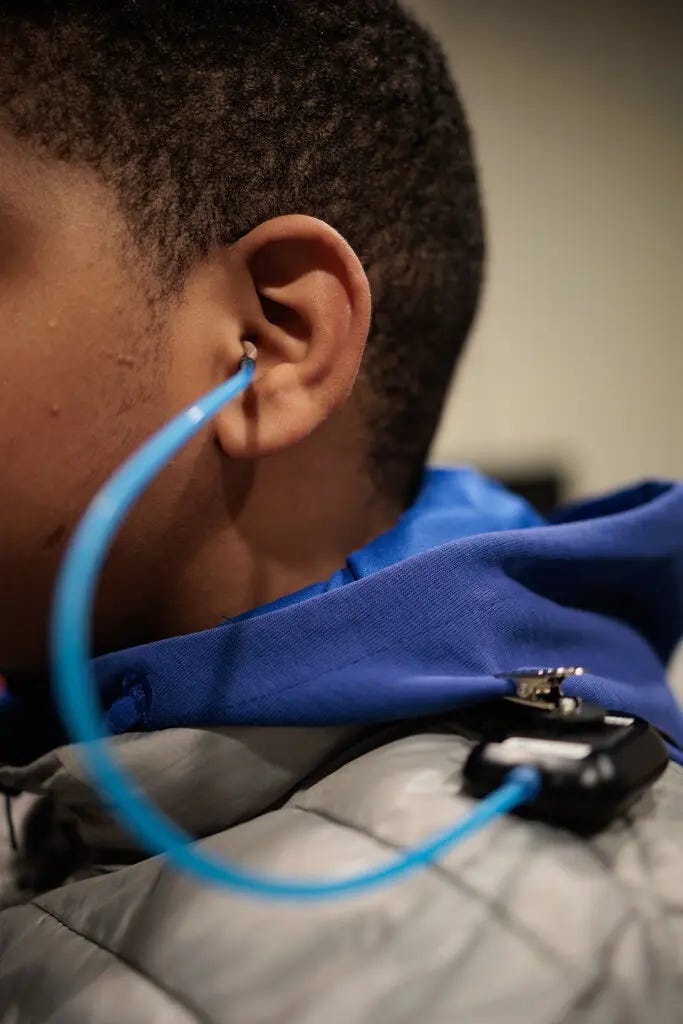Sci-Ed Update 311
Lymphatic discovery, racism physically changes brain, new mpodel of saltwater surface, four ChatGPT lessons, gene therapy for hearing, plagiarism problems, huge COVID surge, consciousness, and more!
Nasal Lymphatic Network Crucial for Brain CSF Drainage

Researchers discovered a crucial network of lymphatic vessels at the back of the nose, which significantly contributes to draining cerebrospinal fluid (CSF) from the brain. This study reveals a previously unknown CSF outflow route, offering insights into neurodegenerative conditions.
The research team used transgenic mice with lymphatic markers and advanced imaging to uncover this network, which connects to deep cervical lymph nodes. Their findings indicate potential therapeutic targets for enhancing CSF drainage, especially in age-related neurodegenerative diseases.
Key Facts:
The newly discovered nasopharyngeal lymphatic plexus is a major hub for CSF drainage from the brain.
The study suggests that activating cervical lymphatics could improve CSF outflow, offering a new therapeutic approach for neurodegenerative diseases.
The research team plans to validate these findings in primates, aiming to advance treatments for conditions like Alzheimer’s disease.
Read more→ AandP.info/11h
Experiencing racism may physically change your brain
Scientists know that Black people are at a greater risk for health problems like heart disease, diabetes and Alzheimer's disease than white people. A growing body of research shows that racism in health care and in daily life contributes to these long-standing health disparities for Black communities.
Now, some researchers are asking whether part of the explanation involves how racism, across individual interactions and systems, may physically alter the brain.
"That could be behaviors like, let's say, a woman clutching her purse as a black man is walking next to her. Or they could be verbal, like someone saying, like... 'I didn't expect you to be so articulate,'" says Negar Fani, a clinical neuroscientist at Emory University who studies people experiencing Posttraumatic Stress Disorder, or PTSD.
Recently, Fani has collaborated with Nate Harnett, an assistant professor of psychiatry at Harvard Medical School, to study how the brain responds to traumatic events and extreme stress, including the events and stress related to racism.
Read more→ AandP.info/u3y
Textbooks Need to Be Re-Drawn: Discovery Upends Understanding of Water's Organization
As analytical methods get more sophisticated, existing scientific models are constantly reexamined. The latest to come under scrutiny is the way molecules are organized at the surface of a volume of salt water.
Researchers from the University of Cambridge in the UK, and the Max Planck Institute for Polymer Research in Germany, found that electrically charged particles, or ions, aren't active on the very surface of the solution, as was previously thought – instead, they're located in a subsurface layer.
Kevin Patton comment→ I love it when our view of nature becomes clearer through scientific exploration.
Read more→ AandP.info/kwj
Sam Altman Says ChatGPT Is Good for Education: Here Are 4 Lessons From My Student
Will generative AI live up to its hype? OpenAI CEO Sam Altman said ChatGPT is particularly useful in three industries: coding, education, and health care, according to CNBC.
While I am not personally familiar with how ChatGPT will help with coding or health care, as a college professor I am tuning my antennae to how the technology will change education.
Here's how generative AI could help with education and four creative and surprising ways one of my students is getting value from using the technology.
Read more→ AandP.info/1a6
Gene Therapy Allows an 11-Year-Old Boy to Hear for the First Time

Aissam Dam, an 11-year-old boy, grew up in a world of profound silence. He was born deaf and had never heard anything. While living in a poor community in Morocco, he expressed himself with a sign language he invented and had no schooling.
Last year, after moving to Spain, his family took him to a hearing specialist, who made a surprising suggestion: Aissam might be eligible for a clinical trial using gene therapy.
On Oct. 4, Aissam was treated at the Children’s Hospital of Philadelphia, becoming the first person to get gene therapy in the United States for congenital deafness. The goal was to provide him with hearing, but the researchers had no idea if the treatment would work or, if it did, how much he would hear.
Read more→ AandP.info/o0e
Plagiarism problems
In her Teaching column in The Chronicle of Higher Education, Beth McMurtrie asks:
What constitutes plagiarism? And do colleges take it seriously?
The answers to those questions may seem clear enough. At Harvard University, where the former president Claudine Gay was accused of serial plagiarism and subsequently resigned, students are told that, “in academic writing, it is considered plagiarism to draw any idea or any language from someone else without adequately crediting that source in your paper.” They are also warned that “taking credit for anyone else’s work is stealing, and it is unacceptable in all academic situations, whether you do it intentionally or by accident.”
Read more→ AandP.info/08i
Listen to a recent “winter shorts” episode of The A&P Professor podcast about academic integrity: theAPprofessor.org/146
There’s a Huge Covid Surge Right Now and Nobody Is Talking About It
Seemingly everyone has come down with at least one bout of illness this winter: sniffles that theoretically pass as “just some bug” if you don’t test for Covid.
But there’s a solid chance, with or without a test, that those sniffles were Covid after all. We’re in the midst of the largest global surge in daily Covid infections since Omicron, with nearly 2 million new infections per day estimated in the US alone. Odds are, you barely noticed.
Read more→ AandP.info/1gw
The One Teaching Strategy That Will Fix Your Anatomy & Physiology Course
In a past episode (139) of The A&P Professor podcast, I introduced the “transducer model” of the brain, comparing it to a mobile phone accessing external servers. More recently, in a segment of Episode 143, I briefly explain the “Orch OR” theory that proposes consciousness occurs as quantum waves in the microtubules of brain neurons. Quantum properties such as superposition could explain how the brain works as a transducer. Recent investigation counters the argument that quantum waves would break down in the warm, wet microtubules.
Listen here→ theAPprofessor.org/143
Consciousness Is a Continuum, and Scientists Are Starting to Measure It
What does it mean to be conscious? People have been thinking and writing about this question for millennia. Yet many things about the conscious mind remain a mystery, including how to measure and assess it. What is a unit of consciousness? Are there different levels of consciousness? What happens to consciousness during sleep, coma and general anesthesia?
As anesthesiologists, we think about these questions often. We make a promise to patients every day that they will be disconnected from the outside world and their inner thoughts during surgery, retain no memories of the experience and feel no pain. In this way, general anesthesia has enabled tremendous medical advances, from microscopic vascular repairs to solid organ transplants.
Read more→ AandP.info/dt7









